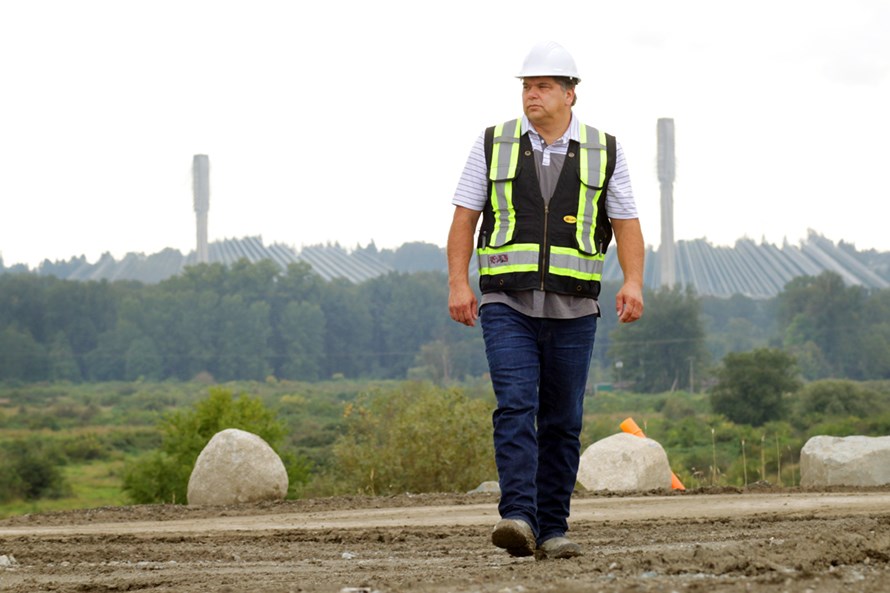It is at least a year away from signing its first tenants, but the Aboriginal-owned Kwikwetlem Business Park in Port Coquitlam is not expected to have much problem filling up due to a severe shortage of industrial land across Metro Vancouver.
The industrial vacancy rate in the Metro region stands at 1.4 per cent, the lowest in Canada. There are virtually no large parcels of industrial land left to develop, according a second-quarter survey by Colliers International.
Chief Ron Giesbrecht of the 107-member Kwikwetlem First Nation, also known as the Coquitlam Indian Band, said the site with frontage on Pitt River Road would be built out in three phases. The first phase will be a $15 million, 105,000-square-foot health and wellness centre for the use of band members and residents of the Tri-Cities area.
The following phases, Giesbrecht said, “will be market driven.”
Those market drivers would likely steer towards distribution warehouses and light manufacturing, according to John Boer of Colliers, who will act as the listing agent for the park with co-Colliers agent Chris Morrison.
Giesbrecht said the Kwikwetlem First Nation is primarily interested in attracting build-to-suit tenants, both commercial and light industrial, under long-term lease agreements to provide steady income.
He said the band would consider selling parcels of the land, which will be offered under 97-year lease agreements. The most recent assessments pegged the leased land values at $1.7 million to $2.25 million per acre, he added.
The development is currently awaiting a master services agreement for water and sewer services with the City of Port Coquitlam, which began negotiations in October 2016.
Laura Lee Richard, Port Coquitlam’s director of development, said a two-year delay for such an agreement is not uncommon. She could not provide a time frame on when the negotiations would complete.
Giesbrecht, who hopes the park will see construction start by next summer, said that the idea to develop the reserve land started 20 years ago. The band’s subsidiary, Saskay Land Development, runs the site and employs many band members.
The big work now is preloading the property and completing geotechnical services, Giesbrecht said.
Kwikwetlem Business Park represents the largest new addition to the industrial base in the Tri-Cities area. The local industrial vacancy rate is 1.7 per cent and less than 100,000 square feet of new space came to the market this year. Another 434,577 square feet is under construction, but the net absorption in the second quarter alone was north of 48,000 square feet.
The latest strata development in Port Coquitlam, by Conwest Group, will deliver 16 strata warehouse units with prices in the $325-per-square-foot range. The project is not yet at the marketing stage but has already received unsolicited offers.
First Nations have a history of industrial land development. The Tsawwassen First Nation (TFN) in Delta is developing the 300-acre Deltaport Logistics Centre, with 100 acres already leased. Phase 2 comprises the second phase of that project and its 200 acres represents the last large parcel of industrial land available in Metro Vancouver. TFN’s preference is to lease fully serviced parcels of 15 to 20 acres, a TFN spokesman said.
There are very few large parcels of industrial land and they are being quickly taken up. Metro Vancouver has seen 20 straight quarters of positive absorption, and new supply still struggles to meet demand, Colliers noted in its second-quarter report.
“Currently there is the greatest amount of industrial space under construction in the history of Metro Vancouver, but so far this has provided no relief to the lack of vacant space,” the report stated.
Industrial lease rates are increasing and prices have reached eye-popping levels. An example is the recent sale of a 49,000-square- foot industrial strata property in formerly affordable Pitt Meadows that sold for $9 million.
Buyers are paying $300 a square foot and more for industrial space in Metro Vancouver, and even prices in Chilliwack are $200 a square foot. Surrey land prices have hit $3 million an acre and recent Langley deals are pencilling out at $2 million an acre. Chilliwack has the lowest price at $1.5 million an acre, but land anywhere is difficult to find, according to a separate study by Avison Young.



